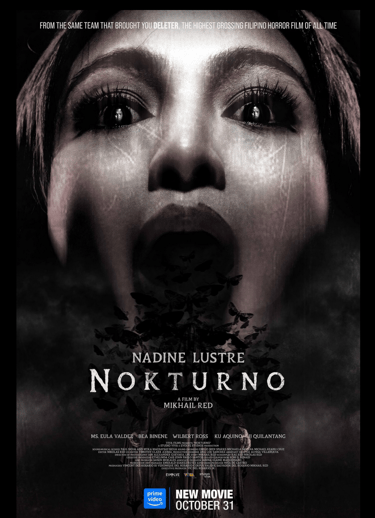Nokturno (2024): A Disappointing Attempt at Filipino Folk Horror
Nokturno (2024), a Philippine folk horror film directed by Mikhail Red, centers on Jamie's return home after her sister's death to face the Kumakatok - supernatural beings whose knocking brings death within three days.
WHAT I'M WATCHING
12/8/20242 min read


Jason and I watched Nokturno as our Saturday evening horror movie pick, and we were thoroughly disappointed. This 2024 Philippine folk horror film, directed by Mikhail Red, attempts to blend local folklore with contemporary horror elements but falls short of its potential despite its strong visuals and atmosphere.
The story follows Jamie, an overseas worker who returns to her hometown after her younger sister Joana's mysterious death. Upon arrival, Jamie discovers her family is haunted by a curse linked to the Kumakatok, supernatural beings from Filipino folklore known for their ominous door-knocking that brings death within three days to those who answer. As Jamie grapples with her family's tragic past and her mother's deteriorating mental health, she must confront these dark forces and unravel the mystery behind the curse.
The film's reception has been overwhelmingly negative, earning an IMDb rating of 3.6/10 and consistently low audience reviews on Rotten Tomatoes, with some as low as 1.5/5.
While the Kumakatok curse presents an intriguing premise from Filipino folklore, the film fails to establish clear rules and mechanics, leading to narrative confusion. The story becomes increasingly convoluted with unnecessary subplots, such as Jun's wife Lorna's sacrifice and the curse's epidemic-like spread through the town. An attempt to explain the curse's origins through a backstory involving American soldiers killing nuns feels forced and only adds to the confusion.
Compared to similar curse-centered horror films like "It Follows," Nokturno's shortcomings become more apparent. Where "It Follows" presents clear rules and consequences, creating genuine tension and urgency, Nokturno's ambiguous supernatural framework fails to establish meaningful stakes.
The character development is particularly problematic. The characters often make inconsistent choices that defy logic of their established personalities. For instance, Lilet (played by Eula Valdez), portrayed as a protective and superstitious mother whose mental health deteriorates after her husband's death, inexplicably allows her youngest child Julius to leave for Manila with his estranged sister Jamie, despite her established fear of the Kumakatok curse. Throughout the film, Jason and I found ourselves repeatedly exclaiming "Anong ginagawa mo?!" While horror movies typically feature characters making questionable decisions, they usually include at least one logical character to guide the others. In Nokturno, rational decision-making is notably absent from all characters.
The film's atmosphere, though attempting to be spooky, relies too heavily on jump scares and lacks thematic depth. This is especially disappointing considering the rich cultural source material, as the Philippine folklore elements feel underdeveloped and fail to resonate with broader audiences.
For Nokturno to have succeeded, it needed:
Clearer establishment of the curse's rules and consequences
More focused narrative without unnecessary subplots
Better developed characters with consistent motivations
Deeper exploration of its cultural elements
Less reliance on jump scares and more emphasis on building genuine tension
These improvements would not only have resulted in a better film but would have contributed more meaningfully to the advancement of Philippine cinema in the international horror genre.
Nokturno is currently available for streaming on Amazon Prime Video.
